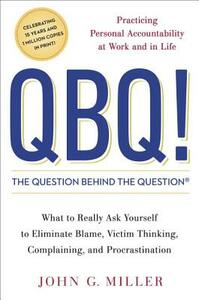Take a photo of a barcode or cover
107 reviews for:
QBQ! the Question Behind the Question: Practicing Personal Accountability at Work and in Life
John G. Miller
107 reviews for:
QBQ! the Question Behind the Question: Practicing Personal Accountability at Work and in Life
John G. Miller
QBQ is a great tool if you’re a white, heterosexual, Christian male experiencing no systemic oppression and work a comfortable corporate job. Otherwise, this book is useless and follows the same lines of spiritual bypassing but in a different format. The fact that all the examples are service workers is annoying and frustrating. I had to read this for work and only question I have now is “How can I never read another book like this again?”
Definitely a book you want to choose to read rather than being forced to read. The basic premise is rather than get frustrated, see stressful situations as an opportunity to advance, learn and grow. Ask how can I improve, what can I do better, how should I serve? and so on. I think it works better in a personal life context or if you're in a comfortable financial position. I think it's kind of awkward tossing this book at employees in perilous positions and being like 'work harder' but equally I'm not certain that's the purpose of the book so perhaps that criticism is unfair... really the book can be condensed into a couple of sentences, and a lot needs to be unpacked that wasn't... it's an interesting concept and probably helpful, but it also seems very shallow and papering over the cracks.
Eh. It wasn't awful, but the whole book probably could have been summed up in a couple of sentences. Especially for people who have worked in a team and have considered self-accountability before.
The author is a pompous, insufferable snob and I found his Home Depot example of personal accountability offensive. The poor cashier. This was highly recommended reading from one of work groups, but fails to provide real tools or frameworks — or anything — to help drive personal or organizational change.
informative
fast-paced
I read this book for the first time a little over a year ago. At the time, I tried to soak in the message, but since I thought it didn't really apply to me, I think it went in one ear and out the other, so to speak.
Fast forward to today. This book is required reading for my work, and I read it a little more closely this time around. As it turns out, this little book is jam-packed with morsels of good advice. It's all about using a JFK-esque philosophy: ask not what your company can do you for you but what you can do for your company. You can insert almost any words you'd like to replace "company": team, client, etc. The whole point of the book is encouraging people to take a moment to think before placing blame. Instead, look in the mirror first and see if YOU can resolve the issue instead of passing the buck as we are so wont to do in this society.
Fast forward to today. This book is required reading for my work, and I read it a little more closely this time around. As it turns out, this little book is jam-packed with morsels of good advice. It's all about using a JFK-esque philosophy: ask not what your company can do you for you but what you can do for your company. You can insert almost any words you'd like to replace "company": team, client, etc. The whole point of the book is encouraging people to take a moment to think before placing blame. Instead, look in the mirror first and see if YOU can resolve the issue instead of passing the buck as we are so wont to do in this society.
challenging
informative
reflective
fast-paced
Great in theory but there are some glaring holes in the author’s thinking. Some facts like “I’m overworked and underpaid”, “I don’t have the tools I need” etc. need to be addressed and are not blame shifting. This book just screams “pull yourself up by your boot straps” and pushes the QBQ method as a silver bullet while ignoring real structural problems.



